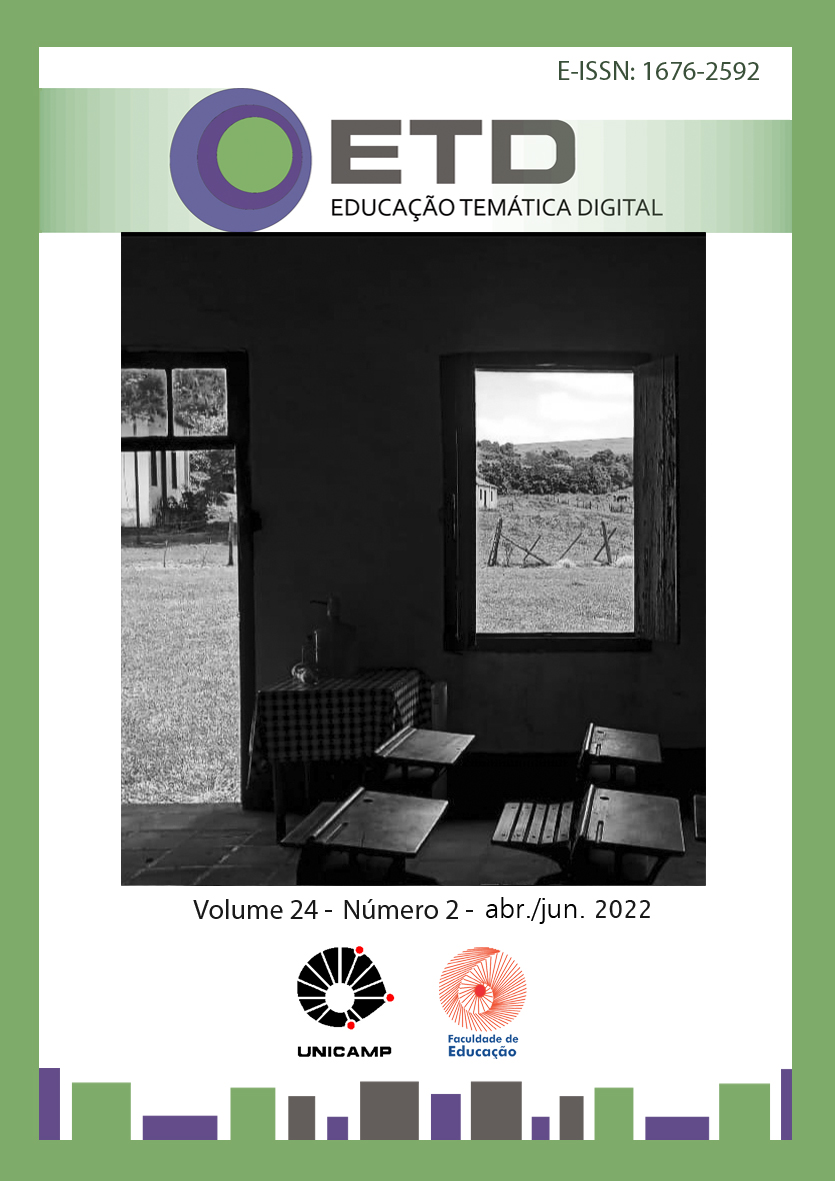Abstract
Virtual Reality is a medium comprised of interactive computer simulations, that identify the participant’s actions and positions. Due to the characteristics of VR and simulations of numerous contexts and situations, it contributes significantly to Teacher Education. The literature review shows a dearth of studies related to the subject. Thereby, the research objective is to analyze the professors and students understanding of Virtual Reality and its application to Teacher Education at Universidade Comunitária da Região de Chapecó (Unochapecó). Therefore, the research design is qualitative and exploratory. There was conducted sixteen semi-structured interviews with professors (n = 4) and students (n = 16) and there was used the content analysis to examine the data. Overall, the research regarding Virtual Reality and Teacher Education are incipient at the international and national levels. However, Virtual Reality contributes to prepare the future professors to the job market as it allows the student to experience situations that are not possible in physical reality.
References
BARDIN, L. Análise de conteúdo. São Paulo: Edições 70, 2016.
BILLINGSLEY, G.; SCHEUERMANN, B. Using virtual technology to enhance field experiences for pre-service special education teachers. Teacher Education and Special Education, 37 (3), 255-272, 2014. DOI: https://doi.org/10.1177/0888406414530413
BILLINGSLEY, G.; SMITH, S.; SMITH, S.; & MERRIT, J. (2019). A systematic literature review of using immersive virtual reality technology in teacher education. Journal of Interactive Learning Research, 30 (1), 65-90, 2019. Disponível em: https://www.learntechlib.org/primary/p/176261/. Acesso em: 08 maio 2020.
BROWN, A. H. Simulated classrooms and artificial students: the potential effects of new technologies on teacher education. Journal of Research on Computing in Education, 32 (2), 307-318, 1999. DOI: https://doi.org/10.1080/08886504.1999.10782281
COTE, M.; BOULAY, J.; OZELL, B.; LABELLE, H.; & AUBIN, C. Virtual reality simulator for sco-liosis surgery training: transatlantic collaborative tests. IEEE International Workshop on Haptic Audio Visual Environments and Games. Danvers: Institute of Electrical and Elec-tronics Engineers, 2008. DOI: https://doi.org/10.1109/HAVE.2008.4685289
COSTA, R. S. da.; OLIVEIRA, E. R. Concepções freirianas e realidade virtual: aprendizagem em artes no ensino fundamental. E-Mosaicos, Rio de Janeiro, v. 6, n. 13, 162-181, 2017. DOI: https://doi.org/10.12957/e-mosaicos.2017.32044
CRUZ, G. B. Didática e formação de professores. Cadernos de Pesquisa, São Paulo, v. 47, n.166, p. 1100-1105, out./dez. 2017. DOI: http://dx.doi.org/10.1590/198053145099
DIEKER, L. A.; HYNES, M. C.; HUGHES, C. E.; HARDIN, S.; BECHT, K. TLE TeachLive™: using technology to provide quality professional development in rural schools. Rural Special Education Quarterly, 34 (3), 11-16, 2015. DOI: https://doi.org/10.1177/875687051503400303
FOLGIARINI, J. L. da C.; DICKMANN, I. Formação inicial na Pedagogia e o trabalho nas esco-las multisseriadas do campo no Oeste de Santa Catarina - Brasil. Revista Formação Do-cente, Belo Horizonte, v. 11, n. 2, p. 121-136, maio/ago. 2019. Disponível em: https://revformacaodocente.com.br/index.php/rbpfp/article/view/225. Acesso em: 08 maio 2020.
FREIRE, P. Pedagogia da autonomia: saberes necessários às práticas educativas. São Pau-lo: Paz e Terra, 1996.
GATTI, B. A. Didática e formação de professores: provocações. Cadernos de Pesquisa, São Paulo, v. 47, n. 166, p. 1150-1164, 2017. DOI: https://doi.org/10.1590/198053144349
GIL, A. C. Como elaborar projetos de pesquisa. São Paulo: Atlas, 2018.
KATZ, Y. J. Kindergarten teacher training through virtual reality: three-dimensional simu-lation methodology. Educational Media International, v. 36, n. 2, p. 151-156, 1999. DOI: https://doi.org/10.1080/0952398990360211
JERALD, J. The VR Book: human-centered design for virtual reality. Nova York: Association for Computing Machinery; Morgan & Claypool Publishers, 2016.
MINOCHA, S.; TUDOR, A.; TILLING, S. Affordances of mobile virtual reality and their role in learning and teaching. THE 31st BRITISH HUMAN COMPUTER INTERACTION CONFERENCE, 3-6 Jul 2017, University of Sunderland’s St. Peter’s Campus, UK. Sunderland, 2017. Dispo-nível em: http://oro.open.ac.uk/49441/. Acesso em: 08 maio 2020.
MOW, J. M.; FOKKENS-BRUINSMA, M.; GERT-JAN, V. Using virtual reality to promote pre-service teachers’ classroom management skills and teacher resilience: a qualitative evalu-ation. 6th INTERNATIONAL CONFERENCE ON HIGHER EDUCATION ADVANCES (HEAd’20), 2-5 Jun 2020, Universitat Politecnica de València, Espanha. Valencia, 2020. Disponível em: http://ocs.editorial.upv.es/index.php/HEAD/HEAd20/paper/viewFile/11049/5561. Acesso em: 26 dezembro 2020.
PASSIG, D. The impact of immersive virtual reality on educators’ awareness of the cogni-tive experiences of pupils with dyslexia. Teachers College Record, v. 113, n. 1, 2011. Dis-ponível em: https://www.tcrecord.org/PrintContent.asp?ContentID=15992. Acesso em: 08 maio 2020.
RECUERO, R. Redes sociais na internet. Porto Alegre: Sulina, 2009.
SHERMAN, W. R.; CRAIG, A. B. Understanding virtual reality: interface, application, and design. San Francisco: Elsevier, 2003.
SILVA, B.; ARAÚJO, A. M.; VENDRAMINI, C. M.; MARTINS, R. X.; PIOVEZAN, N. M.; PRATES, E.; DIAS, A. S.; ALMEIDA, L. S.; RODRIGUES, M. C.; JOLY, A. Aplicação e uso de tecnologias digitais pelos professores do ensino superior no Brasil e Portugal. Educação, Formação & Tecnologias, v. 7, n. 1, p. 3-18, jan./jun. 2014. Disponível em: https://www.eft.educom.pt/index.php/eft/article/view/424/195. Acesso em: 08 maio 2020.
SLATER, M.; WILBUR, S. A framework for immersive virtual environments (FIVE): specula-tion on the role of presence in virtual environments. Presence: teleoperators and virtual environments, v. 6, n. 6, p. 603-616, 1997. DOI: https://doi.org/10.1162/pres.1997.6.6.603
TORI, R.; QUEIROZ, A. C. M.; CORRÊA, A. G. D.; VALERIO NETTO, A. Educação. In: TORI, R.; & HOUNSELL, M. da S. (Org.). Introdução a realidade virtual e aumentada. Porto Alegre: Edi-tora SBC, 2018. Disponível em: http://www.de.ufpb.br/~labteve/publi/2018_livroRVA.pdf. Acesso em: 08 maio 2020.
YIN, R. K. Pesquisa qualitativa do início ao fim. Porto Alegre: Penso, 2016.

This work is licensed under a Creative Commons Attribution-NonCommercial-NoDerivatives 4.0 International License.
Copyright (c) 2022 ETD - Educação Temática Digital


